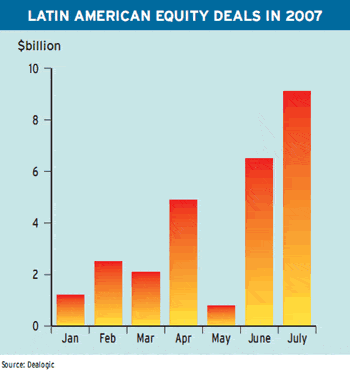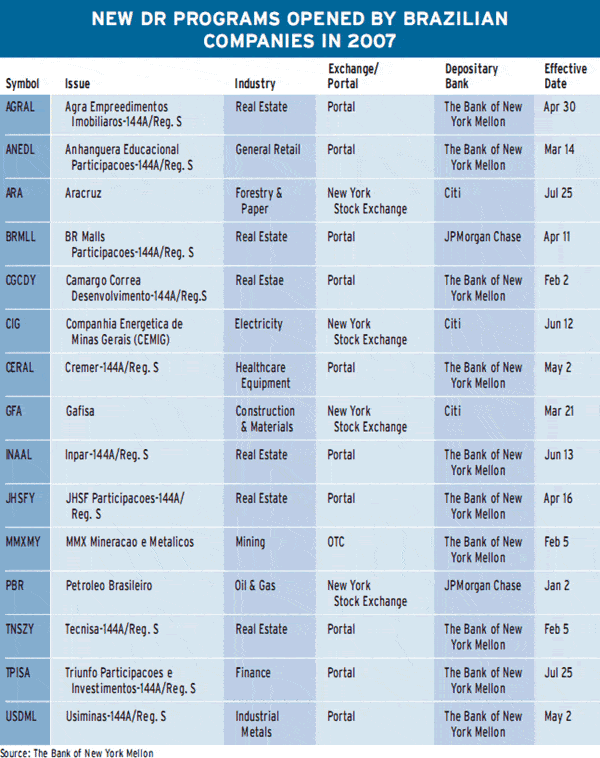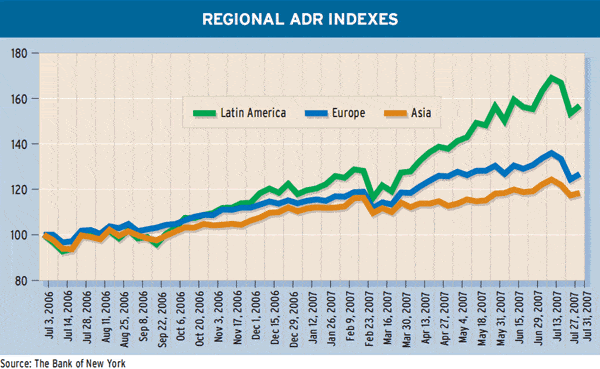Corporate financing news / global equity/drs
 Latin American equity capital markets had their biggest month ever in July, with $9.6 billion in proceeds from 23 issues, an increase of 48% from the previous record of $6.5 billion set only a month earlier, according to Dealogic. There were 80 equity deals completed in the region in the first seven months of this year, raising $27.4 billion, 41% more than in all of 2006, the previous largest year on record for issuing stock.
Latin American equity capital markets had their biggest month ever in July, with $9.6 billion in proceeds from 23 issues, an increase of 48% from the previous record of $6.5 billion set only a month earlier, according to Dealogic. There were 80 equity deals completed in the region in the first seven months of this year, raising $27.4 billion, 41% more than in all of 2006, the previous largest year on record for issuing stock.
Brazil has dominated the Latin American equity capital markets so far this year, with an 83% market share. Brazilian companies raised $23.2 billion from 60 deals between January and July, far ahead of second-place Colombia, whose companies raised $1.3 billion in equity through five deals, Dealogic says. UBS and Credit Suisse are the leading underwriters of equity offerings in Latin America so far this year.
More and more companies from the region are tapping into the US private-placement market under Rule 144A of the Securities Act. In promulgating the rule, the Securities and Exchange Commission hoped to attract more foreign issuers to the US private-placement market and improve the liquidity of that market. The rule permits the resale of certain securities in the US to qualified institutional buyers without requiring the registration of the securities with the SEC. The resale of such issues is limited to investors with at least $100 million in assets, and the issuing company may have no more than 499 stockholders. Rule 144A was designed to facilitate cross-border offerings of securities by foreign issuers that previously avoided raising capital in the United States because of compliance costs or liability concerns, or because of the financing costs involved in selling restricted securities.
Rule 144A Issuance Surges
Latin American equity issuance into the Rule 144A market has more than doubled since 2005, according to Dealogic. In the first six months of this year, Latin America-based companies raised $10.6 billion in 144A equity, compared to $11.9 billion for all of 2006 and $4.3 billion in 2005.
Foreign securities resold in the US under Rule 144A generally are initiated as offshore public offerings. The largest buyers of these securities are institutional investors, such as insurance companies, pension funds, banks and investment companies. The SEC acknowledges that this is a private-placement market and will likely never have the liquidity of a public trading market.
On August 1 the SEC approved the Nasdaq stock market’s new centralized trading and negotiation system for 144A securities. The web-based platform is an outgrowth of Nasdaq’s 17-year-old Portal system and is the first centralized electronic system for displaying and accessing trading interest in 144A issues.
“Nasdaq has operated the Portal market since 1990, so we are uniquely qualified to play a significant role in the 144A market of the future,” says John Jacobs, executive vice president of Nasdaq. He says the platform will improve the efficiency and transparency of the private-placement market and is a natural progression for Nasdaq, given its expertise in electronic trading systems.
New Multi-Broker Platform
David Hermer, head of the Americas syndicate at Credit Suisse, says the multi-broker system will revolutionize the 144A equity market. “With private-placement capital in hand, companies will have the time and flexibility to grow their businesses, evaluate options, gain experience and develop more accurate pricing, all of which can lead to a more effective initial public offering,” he says.
The SEC always intended that foreign companies would use Rule 144A offerings as a stepping-stone to the US public markets. “With the advent of an enhanced private-placement market, companies considering a traditional IPO should have an attractive new option to gain faster, simpler, less-expensive access to the capital they require,” says Michael Cummings, chief operating officer of Wachovia Securities’ equities division.
Nasdaq estimates that the amount of equity and debt capital generated using Rule 144A has grown three-fold since 2002 and exceeded $1 trillion for the first time in 2006. In the first half of 2007, global equity and debt capital raised in conjunction with a 144A tranche was almost $1 trillion, an increase of 43% over the same period last year.
Latin American IPOs Soar
The initial public offering market in Latin America raised $19.6 billion via 56 deals in the first seven months of this year, 75% more than in all of 2006, according to Dealogic. On July 30, São Paulo, Brazil-based Cosan, the largest grower and processor of sugarcane in the world, filed an IPO of 100 million common shares to raise up to $2 billion amid surging demand for ethanol as an alternative to Middle East oil. Credit Suisse, Morgan Stanley and Goldman Sachs are underwriting the issue, which will trade on the New York Stock Exchange. Cosan plans to use the IPO proceeds to build a new ethanol plant, as well as to expand existing plants and to construct electricity-generating plants fueled by sugarcane.
Cosan is the largest producer of ethanol in Brazil. It is concurrently offering an undisclosed number of shares in the form of Brazilian depositary receipts to be listed on the São Paulo Stock Exchange (Bovespa).
Brazil’s second-largest ethanol and sugar group, under the holding company B5, is in talks with Goldman Sachs and other US investment banks on the sale of a minority interest. B5 controls Companhia Açucareira Vale do Rosário and Companhia Energética Santa Elisa, which are in the process of merging. Cosan launched a hostile takeover bid for Vale do Rosário in February, but the bid was defeated after B5 obtained a credit line from Bradesco to purchase a controlling interest.
US private equity funds led by Carlyle have invested $240 million in CNAA, a joint venture between Santa Elisa and US-based Global Foods Holding, which plans to build at least four sugar-processing and ethanol plants in Brazil.
 Sugar-Based Ethanol Gains
Sugar-Based Ethanol Gains
Archer Daniels Midland, the largest US producer of ethanol from corn, is considering entering Brazil’s sugarcane-based ethanol business. Ethanol made from sugarcane is cheaper than ethanol made from corn or soybeans. Sugar prices have fallen sharply due to record harvests.
Açúcar Guarani, another Brazilian sugar and ethanol group, raised $359 million in an initial public offering in July on Bovespa. The share issue was coordinated by UBS and included a 144A tranche in the US.
Brazilian president Luiz Inácio Lula da Silva signed an ethanol regional production agreement earlier this year with US president George Bush. The agreement focuses on promoting ethanol production in other Latin American countries, as well as collaboration on new biofuels technology.
In the financial services industry, Brazilian credit-card transaction processor Redecard sold $2.15 billon of shares in an IPO in July. About 90% of the proceeds were to go to banks that were cashing out, including Citi, which reduced its stake in Redecard to 25% from 31.9%. Citi said it would record a gain of about $400 million from the sale in the third quarter. Redecard handles MasterCard transactions in Brazil.
Mid-Size Banks Active
Brazil’s small and mid-size banks are in the leading edge of the country’s IPO wave, according to Standard & Poor’s. So far this year six mid-size banks have raised new equity, and another three have filed for IPOs in the coming months. These niche banks have taken a lead in developing a lending culture and should continue to show strong growth, S&P; says.
The Brazilian unit of Bahrain-based Arab Banking Corporation, Banco ABC Brasil, raised $330 million from its IPO on Bovespa. UBS Pactual underwrote the sale, with Itaú BBA, ABN AMRO Real, Espírito Santo Investment and HSBC as co-managers.
Banco Votorantim, Brazil’s 10th-largest financial services company, announced that it is opening an investment banking unit to take advantage of the record securities offerings in the country. Share offerings on the São Paulo exchange doubled to $16 billion in the first half of 2007 compared to the same period last year, according to the Tradable Securities Commission, Brazil’s securities regulator.
Brazilian educational services company Kroton Educacional raised $224 million from its IPO on Bovespa in July. Morgan Stanley was the lead coordinator of the sale, which included a portion sold to qualified foreign investors under Rule 144A. Another Brazilian educational services company, Estácio Participações, raised $233 million in July from an IPO, which also included a Rule 144A tranche. UBS was the lead coordinator of the operation.
Shopping center administrator General Shopping Brasil raised $142 million in an IPO handled by JPMorgan, which also had Merrill Lynch as a coordinator. The issue also was sold to foreign investors under Rule 144A.
Some 15 Brazil-based companies have established new depositary receipt programs so far this year, according to The Bank of New York Mellon. These programs include companies from a range of industries, including real estate, electricity, healthcare equipment and mining.


Gordon Platt



